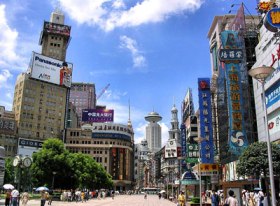Spitting and other types of pollution
I admit it– before moving to Singapore, I thought it was a city in China. But I’m American. It’s expected.
Though I’m not the only one. Several people from a variety of countries asked, ‘Why would you move to China?’ Or, ‘Where’s Singapore??’
It also happens that there was some confusion when I moved to Portugal — plenty of people thought I was moving to South America, perhaps confusing Portugal with Paraguay? Someone (she knows who she is… Lynn) even asked me, ‘So is Portugal right next to Brazil?’
Appalling geography skills aside…
The only reason we came to Singapore specifically was because my husband was offered a job here, and we wanted to live in Asia. It’s not like we sat down, researched the various countries and chose the one we liked best.
Knowing what I know now, would I choose Singapore? I’ve given that question a lot of thought lately, and have come up with a list of the top 6 cities in Asia where I would choose to live, if the choice were 100% my own (i.e., no input from hubby and job offers / visa requirements being equal).
Over the coming weeks I will post my list, starting today with #6 — Shanghai.
(Before jumping in, I should confess that I haven’t been to Shanghai and so the ‘wisdom’ here is based on websearch* and feedback from friends…)
#6 Shanghai
As the most populous city on earth, and a modern mega-financial and multinational hub, there are job opportunities, entrepreneurial opportunities, and it has one of the top-ranked educational systems. It’s also heavily polluted and under communist rule. And people spit. Ew.
Pros
1. It’s so modern that there’s really nothing to miss by being an expat in Shanghai. As a bonus, I’m told that pretty much everything can be delivered to your home or office, and the shopping is, in a word, awesome (tailors who can make anything for you).
2. There’s high-ranking education– in the top 3 best countries (PISA – http://www.oecd.org/pisa).
Although there are many private and international schools as well, if I were to live in Shanghai with my two young children, I’d opt for the local school system. There are pros and cons within this one point alone, though:
Pro: I’d love for my children to become fluent in Mandarin and immersion is the best and fastest way to fluency.
Con: The Chinese learning methodology is pretty hardcore and intensive. The curriculum moves quickly, doesn’t often reinforce before moving on, and expects a lot of work outside of school hours.
3. It’s not hot all the time. Ok so it’s rainy for almost a third of the year. And the humidity can get pretty heavy, especially in July and August, when the polluted moisture clings to your skin with gritty particulates. But I can take extreme heat and humidity if I know it’s temporary, and that I’ll soon enough have a chance to break out the scarves and jackets. It’s the change of weather that I value.
4. Shanghai is reasonably affordable at the moment, though getting more expensive. The Mercer cost-of-living analysis shows Shanghai breaking in to the top 20 most expensive at #16, up from last year’s position at #21. But when you live in the #8 city, #16 seems pretty good.
Cons:
1. When moving to anywhere in mainland China, a foreigner from one of those crazy ‘clean-air’ countries can expect to get bronchitis at least once in the first year. Cough, hack, wheeze, hack, hack. No thanks.
2. Friends who have visited or lived in China say that the communist restrictions are barely noticeable, mostly in the form of censorship, and that the only truly annoying bit is the lack of access to certain websites, including Facebook and porn. So sure, I could live in Shanghai for a year, maybe 2– as an experience (because I’m not one to turn my back on an experience such as this). But, it would turn me into the next con on my list…
3. It’s full of expats with temporary expat syndrome. I find it increasingly difficult to make friends with people who are only looking to cash a pay check and book a ticket on the next flight out. Because of communism and a high density of multinational corporations, Shanghai is particularly full of expats with The Syndrome.
4. People spit (ew). Singapore has a fraction of the spitting culture apparently seen in mainland China, but even here I’ve been subject to many near misses (probably the real reason women use umbrellas in sunny weather). Not too long ago, I watched a man lean over the handrail of the sidewalk, hold one nostril shut with one finger, then clean out his other nostril using strong bursts of gargling and gagging. It was one of those slow-motion-car-accident moments where my brain struggled to process the horror.
If tomorrow someone offered me a job in Shangai, I’d almost certainly take it, barring a better offer elsewhere. That’s just the kind of expat I am. But I wouldn’t seek out a reason to live there.
Notes:
*Websearch: Noun. Web-based research, likely to be less reliable than real research. i.e., to conduct websearch: the websearch he provided contained no scientific hypothesis
Verb. The act of conducting websearch: he was websearching the statistical probability of finding up-to-date information on Wikipedia**
**The statistical probability of finding or up-to-date information on Wikipedia is 1 in 20.***
***Results based on Wikipedia websearch — allow for a 10% margin of error.

